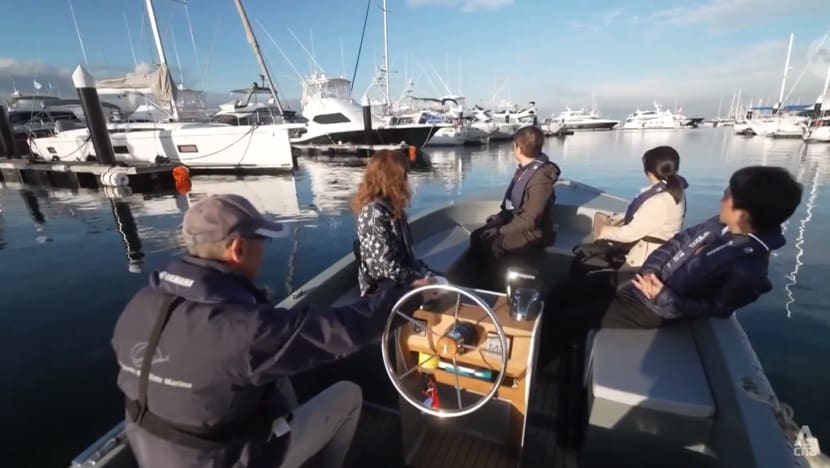Japan’s major marine engine makers join fight against climate change with electric solutions
The industry’s greenhouse gas emissions, which account for 3 per cent of the global total, have increased by 20 per cent over the last decade.

CNA's Michiyo Ishida on a boat that runs on an electric motor and does not emit carbon dioxide.

This audio is generated by an AI tool.
YOKOHAMA: With rising awareness of climate change and its effects, the automobile industry worldwide is rapidly shifting gears by switching from fossil fuels to electric-powered vehicles.
Their maritime counterparts, too, are aiming for carbon neutral options led by Europe and the United States, the world’s largest markets for marine engines.
In a bid to remain competitive, Japan's major marine engine manufacturers are also investing heavily in research and development (R&D) to reach net zero targets.
Among them is Yamaha Motor, a popular Japanese brand which in 1960 applied its small engine technology developed for motorcycles to marine engines. Today, it is also going green, developing electric motors for boats.
“Electrified outboard motors have been introduced in many parts of the world, especially in Europe. As Europe promotes a green economy, we want to catch up with them,” said Mr Toshiaki Ibata,chief general manager of the firm’s marine business operations.
Japanese manufacturers currently have a big global market share in sales of outboard motors and engines. More than 90 per cent of Yamaha’s outboard motors are exported to markets outside Japan, according to its website.
NEED FOR GREENER MARITIME INDUSTRY
The United Nations Conference on Trade and Development (UNCTAD) Review of Maritime Transport this year called for a “just and equitable transition” to a decarbonised shipping industry.
The industry’s greenhouse gas emissions, which account for 3 per cent of the global total, have increased by 20 per cent over the last decade.
“Without action, emissions could reach 130 per cent of their 2008 levels by 2050,” UNCTAD’s report warned.
Alternative fuels show promise, but their adoption remains in the early stages, said the report, adding that 98.8 per cent of the global fleet continues to run on fossil fuels.
“The silver lining is that 21 per cent of vessels on order will operate on cleaner alternatives like liquefied natural gas (LNG), methanol and hybrid technologies,” the report said.Beyond cleaner fuels, the industry needs to move faster towards digital solutions like artificial intelligence and blockchain to improve efficiency as well as sustainability, the review added.
CHALLENGES OF ELECTRIFYING MOTOR BOATS
However, Mr Seiji Saeki, senior managing director at Japan Marine Industry Association, noted that gasoline remains the most practical way of generating power for boats currently.
Nevertheless, Japanese marine engine manufacturers are turning their attention to greening the industry as it continues to expand.
Maritime trade is expected to grow 2.4 per cent in 2023 and more than 2 per cent between 2024 and 2028, according to the UNCTAD report.
Yamaha and Honda are focusing their efforts on developing electric parts while Suzuki is attempting to clean up the environment with its outboard motor that can collect micro plastic waste, said Mr Saeki.
However, challenges remain in electrifying motor boats, which requires a large battery and takes 10 times more energy than electrifying vehicles that travel on land.
These batteries could also take up much space in an already confined area, especially on small boats. Another issue is that electrified boats have yet to be able to sail as fast as their fuel-guzzling counterparts.
Aside from electrification, experiments with other sources of energy are also taking place.
Yamaha Motor’s Mr Ibata said these include hydrogen engines, electro-fuel and hybrid projects that his firm is examining together with automotive maker Toyota for both land and sea use.

















